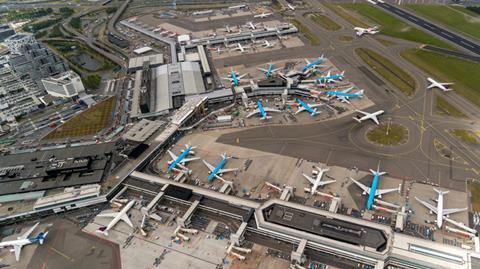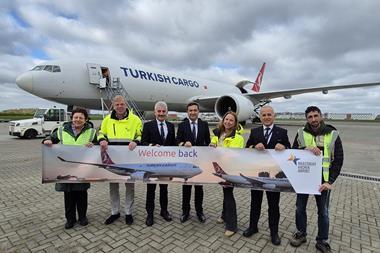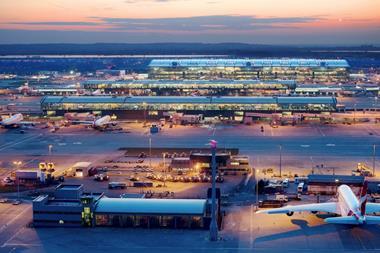
Amsterdam Airport Schiphol’s air cargo community is cooperating and collaborating to meet changing demands caused by the Covid-19 outbreak.
Airlines, handlers, hauliers, freight forwarders, customs and other supply chain partners operating at Schiphol are working more closely than ever before to keep cargo moving through the supply chain.
“We have a strong air cargo community and are proud to see how the supply chain has worked together to ensure the cargo keeps on moving,” says Bart Pouwels, head of cargo, Amsterdam Airport Schiphol.
“What I personally like to see is that all parties are currently working together even more than usual, for example, the Customs authorities are fully cooperating to clear important shipments quickly.”
Changing flight schedule
Since the pandemic started in mid-March, daily air traffic movements into Schiphol have declined 89% and the daily total number of passengers have fallen by 97% compared with last year.
This has led to a decimation in belly cargo capacity which usually accounts for half of cargo volumes and the need for more cargo-only flights to fill the capacity shortage.
Freighter aircraft and combinations of passenger aircraft with freight in the hold have increased and in the last two weeks the average number per week has increased from 260 to 360 flights.
There has also been an increase in the number of freight charters while passenger planes loaded with cargo are also being operated, and represent about 10% of the extra flights being flown.
Pouwels said the strong air cargo community at Schiphol has been vital to meet the ever-changing flight schedule.
“We are in contact with our customers on a daily basis,” said Pouwels.
“We are constantly hearing new information about schedules from airlines and cargo handlers and we process that and then coordinate it with the Schiphol operations team to make it appropriate.
“Close cooperation is very important now.”
Schiphol’s main focus is making sure that the current skeleton network is maintained and freight demand accommodated, especially medical supplies and the airport is in contact with customers on a daily basis to ensure this.
Changing cargo flows
The Covid-19 pandemic has led to a shift in cargo flows at Schiphol and some usually high-volume verticals have decreased such as the import and export of flowers.
Since the Covid-19 outbreak, there has been an increase in the movement of medical goods and aircraft have been arriving loaded with bandages, mouth masks, glasses and gloves to help with the Netherlands and Europe’s fight against the virus.
Normally these are not time-critical goods and are transported by sea freight, but shipments are being diverted to air freight as faster delivery is needed to meet strong and quick demand.
“Freight is very crucial at the moment to ensure all medical and other urgent goods can be delivered on time,” said Pouwels.
“Absenteeism is not yet a problem. But how can we deal with all the players in the chain if absenteeism becomes really high? We will keep an eye on that through daily contact with Air Cargo Netherlands.”
Imports and exports
The general trend at Schiphol during the Covid-19 outbreak is that there is a lot of imports, but exports are lagging behind.
Schiphol is seeing different cargo trends during the Covid-19 outbreak and is processing large amounts of imports from China and the US, which is proving costly for operators as there is an imbalance.
Schiphol records lower cargo volume in the first quarter in comparison to previous year. The increase of full freighter flights doesn’t compensate for loss of belly cargo.
Dutch customs takes action
To handle the large amounts of imports as well as to clear certain goods, such as medical supplies swiftly, Dutch customs are keeping a close eye on all developments.
Their process-teams are working around the clock to accommodate all shipments, and an extensive back office has been set up to handle all Covid-19 related questions quickly.
“At the moment we have three main priorities,” said Henriette Bongers, director of cargo customs at Amsterdam Airport Schiphol. “First of all we need to keep all our employees safe and healthy.
“Secondly we need, even in this time, to protect what goods are coming into the European Union and thirdly we have to keep the chain moving. This means that in times like these we need to be flexible and act fast appropriately.
“Together with Air Cargo Netherlands, Schiphol and other stakeholders we try to forecast what’s coming, so we are prepared to meet demand,” Bongers says.
The outlook is unclear at Schiphol due to the uncertainty surrounding Covid-19, but cargo and the strong community spirit, cooperation and collaboration will remain vital throughout the crisis.
Click here for the latest Covid-19 updates from Amsterdam Schiphol.










